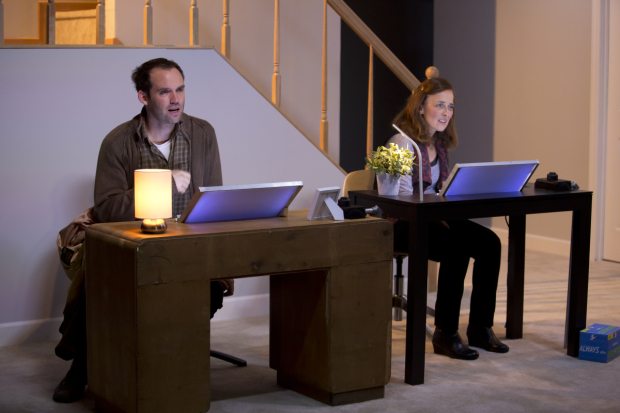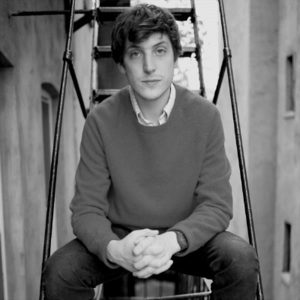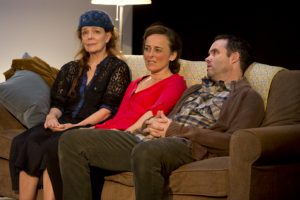

In the year 2040, in a world without plays and cancer, there is always the 'system' to provide us with art and anguish. But in Max Posner's new play Judy, that system can be as unreliable and sensitive as the dysfunctional basement dwelling family members that use it. Judy has gone. Her husband, his siblings and the next sheltered generation bicker, reflect and spend valuable time together in the just-familiar world of Posner's creation. We spoke with the playwright about working with Page 73 Productions, how living in New York has influenced his writing, and what technology and religion of the future may look like.
You were the 2012 Playwrighting Fellow for Page 73 Productions and now they're premiering the play Judy, your New York debut at the New Ohio Theatre. How closely have you worked with Page 73 over the last couple of years and consequently, has your approach to writing changed or advanced in any significant way since being involved with them?
I became the P73 Fellow shortly after moving to New York. It was during that year that I really discovered how to work with actors. I learned what sorts of technical skills my plays demanded. I found actors who understood the kind of speech I'm trying to capture, and their voices pushed me deeper into my writing. It was also the first indication that anyone was going to read the things I wrote. As a result, I spent more and more time banging my head against a wall trying to learn how to grow, prune, and rethink my first couple of plays, wanting to make them bigger, more intricate, more organic, and more alive.
Did Page 73 assign a director to your play? How involved were you in the staging and casting of Judy and how familiar were you previously with the work of director Ken Rus Schmoll?
I've known Ken for a few years. I've been a huge admirer of his work and his way. He understands how language can shape a universe onstage. We have a shared sensibility. We workshopped a different play a couple years back with Page 73. Ken also runs the Soho Rep lab, where I began writing Judy. He's really been hovering around these characters and this world since the beginning.
In Judy, the adult siblings and their various offspring are tight-knit and supportive of one another, despite an obvious void created by pretense, unease and loneliness. As dysfunctional families go, how important was it for you while writing this play to present a family that, no matter what the setting, is recognizable and relatable?
The siblings and their offspring always felt close to me, to people in my family, to people I know, to people in the plays I love. When I was starting to write Judy I was really obsessed with the Prozorov family in Three Sisters. I was interested in their longing and their delusions, but also in their selective hearing, in the ways they avoid each other. I really wanted to capture systems of relationships and patterns of communication that had been marinating in my consciousness for a long while. I do think there's a lot of love there. There's a lot of connection. There are just layers of armor and years of practice that prevent the siblings from being fully vulnerable with each other. They show up when they need to, even if they don't know what to say. I don't think of the dislocation in the play as a nightmarish portrait of our future -- I'm trying to reflect on habits that people have right now.

You're in your mid-twenties. By 2040, when the play is set, you'll be approximately fifty years old. Does setting the play in 2040 around middle-aged siblings deliberately reflect the age you'll be by then?
Yes I guess it does. In this sense, it really isn't a Sci-Fi exploration. It's about finding a slightly skewed container that enables us to observe elements that exist in today's culture with a little more distance. I just want to make the familiar strange so that we can see it from a new angle. The panic and longing experienced by the siblings in Judy is born out of this experiment -- taking things that I observe and pushing them a couple inches further.
Do you think that technology will isolate and separate people to such a degree that interpersonal communication will become as strained as it is in Judy?
I think technology already has isolated and separated people. I also think it's brought people together and provided easier access to each other. So, it's complex. It's not all bad and it's not all good, it's just very different. There are ways in which we're already very strained by technology, absolutely. Not everyone, not all the time, and not terminally. But the world has shifted seismically in my lifetime.
Technology itself doesn't govern your play and your play isn't about that. It's the modern references in past tense that the characters of Timothy, Tara and Kris occasionally recall that provides Judy with the relevant near-future feel. Swearing and much of the outdoors appear to be a thing of the past. Is getting rid of some of the things we take for granted a device for restricting what appears to be a shrinking world?
In Judy I do think the world has shrunk. It's expanded in invisible ways, but the physical world has definitely shrunk. The characters rely on each other and on their imaginations to make the world expand. That's where the séances in the play come in. People are alone in rooms for longer hours. The lines between the workplace and the home, the home and the computer have vanished. Everyone gravitates to the chair that faces the screen in the emptiest room in the house. This doesn't mean they're miserable. Kris is volunteering at a hospital in Iran. Tara is trying to figure out what God is. They're reaching across great distances in certain ways, but from the same chair in their basement. I do think we've become indoor animals.
On the cursing front, I'm not trying to accurately predict which words will go extinct, I'm trying to be playful with the idea of language cycling, with certain words losing their power or meaning, becoming dulled. Their relationship to cursing seems to have changed, but many of the characters still do do it. I just think time will change the way we speak in small, silly ways. I think it already has.
Your characters Tara and the two children Kalvin and Eloise wish to connect with something spiritual while the more cynical characters Timothy and Kris, albeit jokingly in a later scene, seem happy to facilitate this. Is the need for something other in a restrained world bursting with unanswered questions, based on any observations of yours and if so what are they?
The family at the center of Judy is struggling to find their center. Each of them, separately, are trying to process a large absence. They've become a bit decentralized, even though they live in the same zip code. There is a need to unify, to rewrite their relationships to themselves and to each other, to understand these absences. Religion could do help with this. Magic could help with this. Even fake, imaginary magic could maybe help with this. There are things these characters are desperate to resurrect. Some of them are impossible, like Timothy's marriage. Others are more within reach, like Kris' sex life, or faded memories of their deceased parents.

How have you found New York City since relocating here from your native Denver back in 2011?
At first I couldn't sleep because there was so much noise. I couldn't read on the subway because I was too transfixed by all the characters. Now, I can sleep and I can read. It feels like home.
Has living here changed the way you think about storytelling?
New York has encouraged me to tune into how crazy and amazing speech can really be and really sound. So many of the things people say into their phones and across sidewalks are pretty unbelievable. I also think New York has taught me to become comfortable with density. There are so many narratives competing, so many images. It's such an intricate, inefficient, life-like mess.
At this stage, in what shape or form are your future projects?
Juilliard is performing my play SNORE in October. I'm also working on new play commissions for Playwrights Horizons, South Coast Rep and a Libretto for the Brooklyn Youth Chorus.
Performances of Judy continue through September 26 at the New Ohio Theatre.